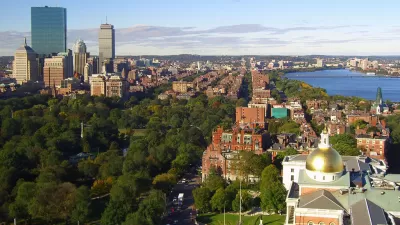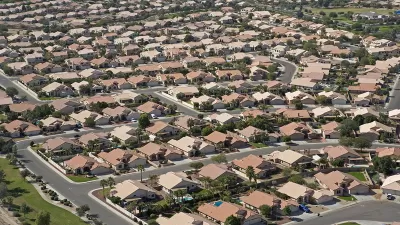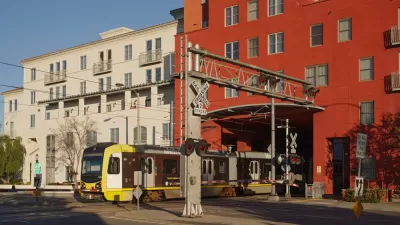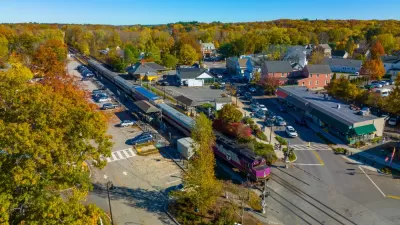A Massachusetts law aimed at reducing the state's housing shortage mandates zoning for multi-family housing in most eastern Massachusetts jurisdictions.

A Massachusetts state bill designed to boost housing production and increase density near transit will limit access to state grants for municipalities that don't comply with upzoning regulations, reports Henry Grabar.
The law mandates that communities zone for "as-of-right" multi-family apartment construction in formerly single-family neighborhoods in order to alleviate the state's housing shortage. As Grabar notes, "The mandate applies to places served by or adjacent to stations of the Massachusetts Bay Transportation Authority, the state agency that operates the buses and trains that fan out of Boston," with the biggest burden placed on "bedroom suburbs" that, despite having excellent transit, continue to limit housing production with exclusionary zoning that keeps housing costs high and supply low.
The new regulations require designated communities to zone or rezone at least one district to 15 homes per acre, compared to the current average of 6.2 homes per acre. Grabar points out that "That corresponds to a relatively dense but recognizably suburban fabric, such as town houses or duplexes around shared yards."
While state leaders hope a blanket policy will eliminate lengthy local hearing processes and reduce development costs, there are concerns about ways that resistant communities could circumvent or ignore the new law by adjusting zoning maps or imposing unreasonable restrictions.
FULL STORY: Can You Force the Suburbs to Build Apartments? Massachusetts Is Trying.

Study: Maui’s Plan to Convert Vacation Rentals to Long-Term Housing Could Cause Nearly $1 Billion Economic Loss
The plan would reduce visitor accommodation by 25,% resulting in 1,900 jobs lost.

North Texas Transit Leaders Tout Benefits of TOD for Growing Region
At a summit focused on transit-oriented development, policymakers discussed how North Texas’ expanded light rail system can serve as a tool for economic growth.

Why Should We Subsidize Public Transportation?
Many public transit agencies face financial stress due to rising costs, declining fare revenue, and declining subsidies. Transit advocates must provide a strong business case for increasing public transit funding.

How to Make US Trains Faster
Changes to boarding platforms and a switch to electric trains could improve U.S. passenger rail service without the added cost of high-speed rail.

Columbia’s Revitalized ‘Loop’ Is a Hub for Local Entrepreneurs
A focus on small businesses is helping a commercial corridor in Columbia, Missouri thrive.

Invasive Insect Threatens Minnesota’s Ash Forests
The Emerald Ash Borer is a rapidly spreading invasive pest threatening Minnesota’s ash trees, and homeowners are encouraged to plant diverse replacement species, avoid moving ash firewood, and monitor for signs of infestation.
Urban Design for Planners 1: Software Tools
This six-course series explores essential urban design concepts using open source software and equips planners with the tools they need to participate fully in the urban design process.
Planning for Universal Design
Learn the tools for implementing Universal Design in planning regulations.
Ascent Environmental
Borough of Carlisle
Institute for Housing and Urban Development Studies (IHS)
City of Grandview
Harvard GSD Executive Education
Toledo-Lucas County Plan Commissions
Salt Lake City
NYU Wagner Graduate School of Public Service





























